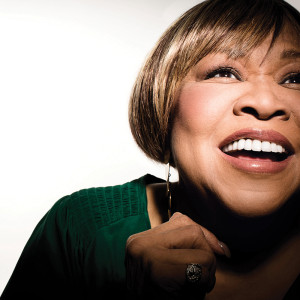 Mavis Staples
Mavis StaplesFew singers can “mmmmph” as soulfully as Staples, hooking the listener before she even gets to the opening lines.
“I know a place, ain’t nobody cryin’ ….”
The song is, of course, “I’ll Take You There,” the Staple Singers’ No. 1 hit from 1972. Mavis Staples sings lead. She also sang for Martin Luther King, turned down Bob Dylan’s marriage proposal, and made records with Steve Cropper, Curtis Mayfield, The Band, Prince, Ry Cooder and Jeff Tweedy of Wilco in a career that now spans more than half a century.
Her father, Roebuck “Pops” Staples, once told her, “If you sing from your heart, you’ll reach the people.”
A documentary about Staples premiered at Austin’s SXSW Film Festival in March and is slated to appear on HBO. She won a long-overdue Grammy Award in 2011 and, in 2015, she will headline the National Folk Festival in Greensboro.
“When my manager told me about it, I said, ‘How have we missed them all these years?’” Staples says. “We’ve been around a long time. We’re grateful to be invited this year.”
Staples represents a rich American tradition of gospel music, freedom songs and R&B. Her father left a Mississippi cotton plantation for Chicago in 1935. Mavis was born four years later. The Staple Singers started performing at churches around Chicago in 1948.
Mavis was a child prodigy by age eight and got advice early on from the Queen of Gospel.
“One day Pops came in from work,” Staples says. “He said, ‘Guess what, Mavis?’ I said, ‘What, Daddy?’ He said, ‘They want us to open up for Sister Mahalia Jackson down at the Tabernacle Baptist Church on Monday night.’ And lord, my little heart felt like it was coming out of my chest.”
Though her mother admonished her not to get on Jackson’s nerves, young Mavis would not be deterred.
“When I saw her come in that door, I made a beeline,” Staples says. “I got over to her and I said, ‘Well hello, Miss Sister Mahalia Jackson.’ And she said, ‘Hi, baby — how you?’ I said, ‘Oh, I’m fine. My name is Mavis, and I sing, too.’ I was rough. She said, ‘Oh you do, huh? Well, I want to hear you sing.’ I said, ‘Yes — I sing with my father, my brother and my sister, and you’ll hear me, ’cause I sing loud.’”
Jackson gave her advice on taking care of herself, telling Staples, “You want to get to be an old lady and get to sing a long time.”
The Staple Singers toured the gospel and folk circuits in the 1950s and early ’60s — leading to a “little courtship” between Staples and Dylan, though she felt she was too young to accept his marriage proposal. During that era, Pops enjoyed hearing Martin Luther King preach on the radio. The family attended one of his church services in Montgomery, Alabama. Afterward, Pops called the family together in his hotel room.
“He said, ‘Listen y’all: I like this man, and I really like his message. And I think that if he can preach it, we can sing it,’” Staples says. “That was the beginning. We started writing freedom songs and we joined the movement. We would sing before Dr. King would speak. One song he just fell in love with was ‘Why (Am I Treated So Bad).’ Pops wrote that song around the Little Rock 9, the nine Black kids that were trying to integrate the schools down there.”
When fellow Chicagoan Barack Obama was elected president in 2008, becoming the first African American ever to hold the office, Staples shared her joy with her late father and the slain civil rights leader.
“That night I talked to Pops, I talked to Dr. King, and I cried a bucket of tears,” she says.
The Staples embraced more secular music as the ’60s waned, paving the way for their biggest hits in the ’70s: “I’ll Take You There,” “Respect Yourself” and “Let’s Do It Again.” Staples and her sisters were crestfallen when “I’ll Take You There” lost out in the Grammy Awards to the Temptations’ “Papa Was a Rolling Stone.” Pops told them to keep their heads up: “You’re singing for your just reward, and you’ll get that one day.”
Staples released albums under her own name beginning in 1969, and carried on singing, recording and performing as the Staple Singers wound down in the years leading up to the death of Pops in 2000. Her father lived long enough to see the group inducted into the Rock and Roll Hall of Fame in 1999.
Producers who have worked with Staples in recent decades have included Prince, Cooder and Tweedy. When the Tweedy-produced album “You Are Not Alone” received a Grammy nomination in 2011, Staples told her late father she had waited long enough.
“I guess I felt like I deserved it — I’ve been singing all these years,” she says. “I said, ‘Daddy, I’m sorry, but I’m gonna go to these Grammys, and I’m hoping I win it.’”
And she did.